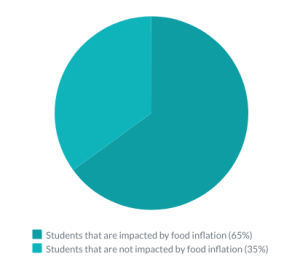Students at the University of Guelph-Humber are struggling to maintain a healthy diet while staying on budget due to the spike in food inflation.
Food prices are at a 40-year high, currently 10.8 per cent higher over the last year. As inflation is slowly declining, groceries are only getting more expensive leaving many Canadians frustrated.
At Guelph-Humber, 65 per cent of students admit to cutting down on groceries to make ends meet due to the ongoing food inflation. The survey revealed that students who live with their parents are less likely to cut down on groceries and many are unaware of the increase in prices. On the other hand, students that are living alone or financially independent expressed difficulty of managing money. The recent food inflation simply adds to those challenges.

Source: Kanishya Kanheswaran (September 27th 2022)
Post-secondary students, including Sriluxaan Siva who attends Guelph-Humber, are feeling the frustration of staying on budget while consuming the required nutrients that a growing individual needs. He mentioned how after he started working out, he needed more protein in his body, and due to the recent inflation, he resorts to protein powder. “I’ve been trying to eat more things that contain a high amount of protein like eggs, fish, and especially chicken breasts but they are much more expensive than they used to be, so I just stick to my protein powder since it gives me the same amount of protein for a cheaper price,” he says.
Siva, like other students, is turning to processed foods as they are much cheaper than fresh foods and they “get the job done.”
Although processed foods may keep individuals full or in Siva’s case give him the protein that he needs on a budget, these foods also come with an excessive amount of sugar, fat, and sodium. A balanced diet is important to students in post-secondary as it helps increase energy levels, the ability to cope with stress, and increases their overall performance in school.
Nilane Arulalagan, a post-secondary student and owner of Fit by Nilane, a health, wellness, and lifestyle blog expresses the struggle to receive the necessary nutrients and the contrast in her ability to focus with a balanced diet compared to a poor diet.
“Inflation has forced me to purchase cheaper food items which come with the trade-off of not having as many healthier and holistic food options. With a poor diet, much of class time is spent in a state of fatigue and brain fog. This is in contrast to the more focused and productive state I feel when eating nutrient-dense foods.”
Some students are forced to skip meals because inflation not only puts healthy ingredients out of reach but three square meals as well. According to a survey conducted, two out of five students skip breakfast due to lack of time and refusing to buy something to eat from campus. The students that said they always have something to eat in the morning often referred to the cheap iced coffee on campus to wake them up in the morning along with a cookie.
Priyanka Rodé, a dietitian nutritionist who is dedicated to constructing nutrition plans that are suitable for every individual client expresses the importance for students to have breakfast and a healthy balanced diet. She says, “a healthy breakfast is one that consists of a mix of macros including protein, carbohydrates and fat.”
A major reason behind students not receiving a mix of macros in their breakfast is due to poor planning and not having enough time in the morning to make a healthy breakfast. Although it may seem impossible to some individuals, Rodé believes that meal prepping is the most effective way to ensure students are receiving the proper nutrients while managing their money and time.
“Meal prepping ensures that when buying groceries, it eliminates the possibility of purchasing items that will go to waste and allows them to buy meals in bulk saving some money. By researching ahead of time, and planning out meals for the week, students can also get balanced and healthy meals” says Rodé.
If the students are able to set some time aside at the beginning of the week to prepare their meals in bulk, they will have fresh meals stored for them to consume throughout the week.
One way to get around the higher prices of fish and meat is to eat alternatives such as tofu and beans. Fruits and vegetables have spiked up in price but instead of buying them fresh, Rodé suggests purchasing frozen or canned items. Not only do these foods tend to cost less than fresh groceries, however, they also last longer avoiding wastage.
Food inflation has made it difficult for students to acquire nutritious meals. Students hope that soon enough, a nutritious meal will not be exorbitant.